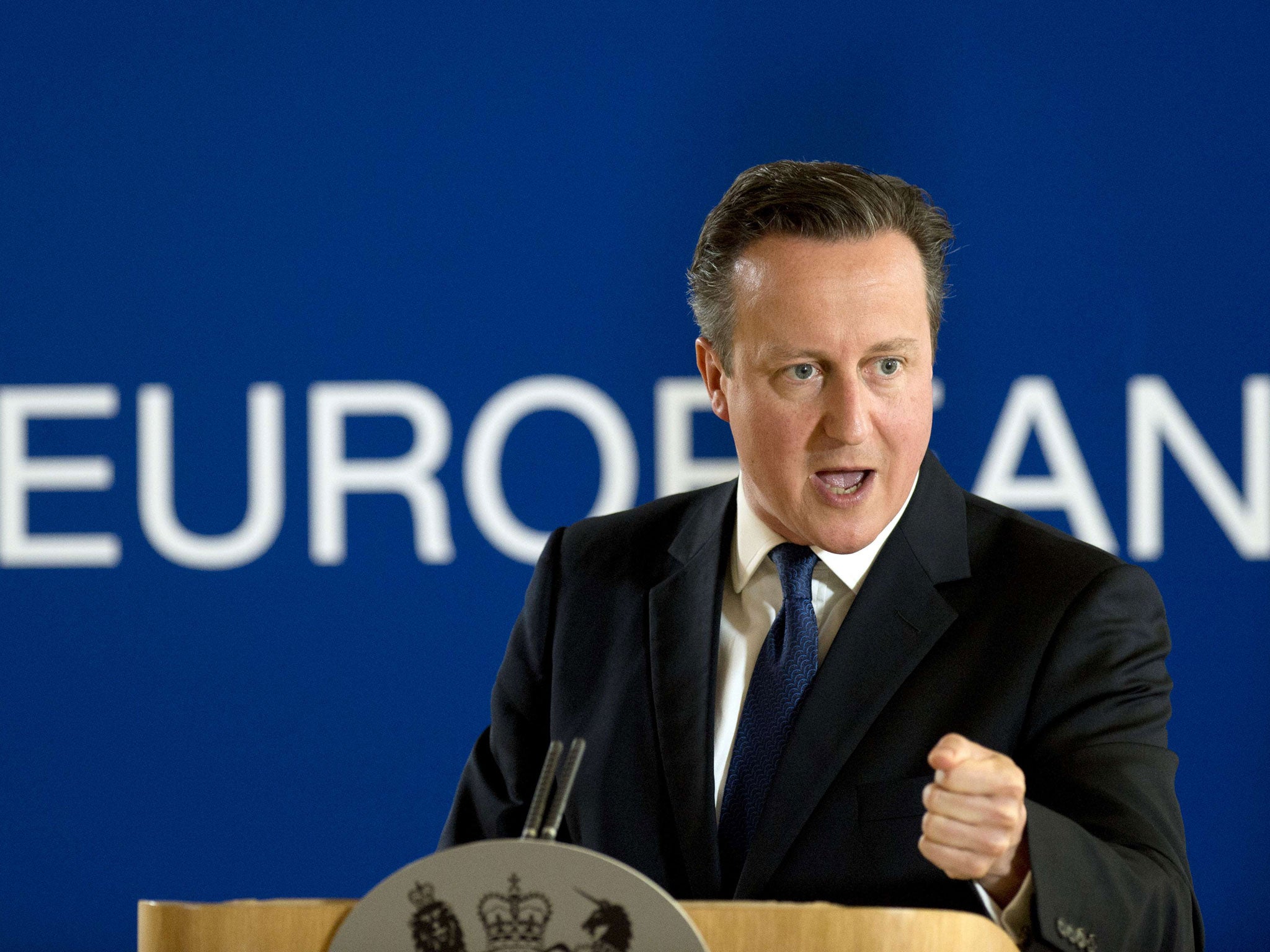Forget Jeremy Corbyn - it's David Cameron who needs to be clear about where he stands on Europe
Neither the Prime Minister, nor any member of his cabinet, has said unambiguously that Britain staying in the EU is a good thing


There was a palpable whoosh of relief in Labour’s pro-European circles as Jeremy Corbyn told the BBC he would not be campaigning for Britain to leave the EU.
He followed that up with an article in the Financial Times stating Labour would not join any out campaign and instead work with other left parties in Europe for pro-growth, anti-austerity policies.
His statement appeared to settle the issue after the shadow Chancellor, John McDonnell, contradicted assurances from both the deputy leader, Tom Watson, and shadow foreign secretary, Hilary Benn, that Labour would not consider leaving the EU under any circumstances.
The shadow Justice Secretary, Lord Falconer, also told the BBC he could not serve under Corbyn if Labour moved to an 'out or leave' position. And the respected shadow Europe minister, Pat McFadden, made clear he would only serve in Corbyn’s team if the new leader slapped down loose talk about the matter. Nigel Farage’s crowing about Corbyn potentially backing the Ukip line had made clear to the new Labour leadership the kind of xenophobic English nationalist campaign they could end up endorsing.
More on this:
Jeremy Corbyn: Our EU referendum debate has been hijacked by xenophobes and money men
The complacency of Europhiles could lose them the referendum
But the real person who should be asked to clarify his position on Europe is the Prime Minister.
Unlike Watson or Benn, neither David Cameron nor his foreign secretary nor any member of the cabinet have come out unambiguously and said Britain staying in the EU is a necessary and good thing for the nation.
Instead David Cameron leaves the nation guessing while he says he will carry out talks with other European leaders in order to produce a renegotiation settlement which alters Britain’s relationship with the EU.
Dependent on the outcome of these discussions is the position the prime minister will take. Several of his cabinet ministers have indicated they would have no problem with Britain voting to leave. They have not been slapped down by the prime minister nor subject to any press criticism such as has been levelled at Corbyn over the zig-zagging lack of clarity on Europe emerging from his shadow cabinet since he became leader.
However the view that Corbyn has given a blank cheque to the business version of a free trade, economically liberal EU needs qualification. As he told the BBC: ‘What I was opposed to is the idea that David Cameron could give to give up workers’ rights and environmental rights. Europe has an interesting twin track up until Maastricht, signed in 1992, there was a growth in the social Europe. Post-Maastricht, it has been a free market approach. I want to see something different." And in his FT article he underlined his opposition to TTIP, the proposed US-EU free trade treaty.
That is also where some leading trade unions are. They are now making clear that if Mr Cameron brings anything back from his EU talks that hints at a lowering of so-called Social Europe directives and regulations they may campaign against the deal.
There are shades here of what happened in France in 2005, when leading socialists like Laurent Fabius and Arnaud Montebourg, decided they could trip up President Chirac and called for – and won - a No vote on the EU constitutional treaty referendum which Chirac was endorsing along with Socialist Party leaders who were left wrong-footed by the split.
Unfortunately, the UK referendum will also be a vote on David Cameron’s popularity as well as on the merits of the leaving or remaining in the EU.
He is caught between not wishing to alienate trade unions and 30 million British employees and not repudiating the demands of the CBI and other business organisations for a reduction of working time and other social Europe regulations they intensely dislike.
For a decade Cameron has headed a party intensely suspicious when not downright hostile to the EU. He has pandered to rather than confronted those anti-EU prejudices.s
Labour has nominally been pro-EU but since 2005 no Labour leader has gone out to make a convincing case for European integration. The imposition of austerity politics and the handling of Greece has upset many on the left.
So Corbyn’s statement while calming down immediate fears amongst Labour pro-Europeans still leaves room for a different approach. He wants a more social Europe and a less free market Europe. If he cannot achieve those aims, what line will he then take?
But the real question should be put to the Prime Minister. When he is going to make his position clear and when is he going to tell his party that the days of dreaming about Britain leaving the EU are now over?
Denis MacShane is Labour’s former Minister for Europe and author of 'Brexit: How Britain can leave Europe', to be published by IB Tauris

Join our commenting forum
Join thought-provoking conversations, follow other Independent readers and see their replies